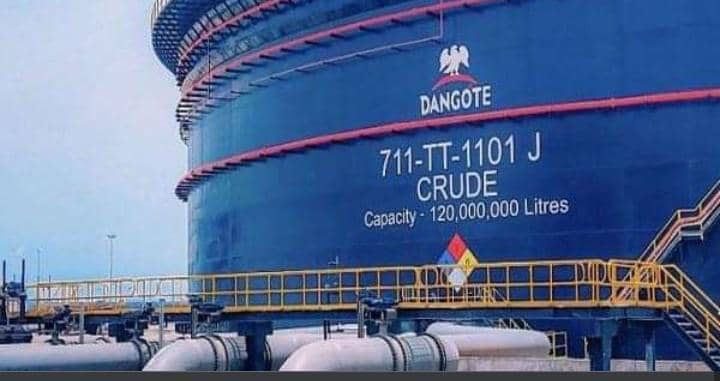
As Dangote Refinery ramps up production of petrol and diesel, the company says it is strengthening energy security, stabilising prices, and reducing Nigeria’s dependence on imports…..
The Dangote Petroleum Refinery has reaffirmed its commitment to ensuring a steady and uninterrupted supply of petrol and diesel across Nigeria, saying its daily production far surpasses national demand and is helping to stabilise the energy market.
Speaking on the refinery’s performance, Group Chief Branding and Communications Officer, Dangote Industries Limited, Anthony Chiejina, said the facility currently loads over 45 million litres of Premium Motor Spirit (PMS) and 25 million litres of Automotive Gas Oil (diesel) daily volumes that exceed Nigeria’s consumption levels.
“Our refinery is loading more than enough to meet the nation’s fuel needs,” Chiejina said. “We are working closely with regulators and distribution partners to ensure efficient nationwide delivery. Dangote remains steadfast in its commitment to supporting Nigeria’s energy stability and boosting consumer confidence.”
According to him, the increased local production has also played a significant role in stabilising the naira and improving foreign exchange liquidity.
> “By reducing foreign exchange outflows and increasing inflows, we’re strengthening the naira and supporting the broader economy,” he noted.
Chiejina further defended the recently introduced tariff regime on imported petroleum products, describing it as a “necessary and patriotic step” designed to protect Nigeria’s domestic industries from unfair competition.
“It would be unpatriotic to criticise the new tariff. Dumping creates poverty, discourages industrialisation, and leads to job losses,” he said. “Across the world, governments protect their local manufacturers. Nigeria must do the same. Dumping destroyed our once-thriving textile industry, we cannot allow that to happen again in the oil sector.”
He called on the Federal Government to strengthen monitoring and enforcement to curb the dumping of substandard or toxic petroleum products by unscrupulous importers. Such practices, he said, not only jeopardise public health but also undermine the country’s industrial development goals.
“Past dumping practices discouraged serious investors from establishing industries here,” he said. “The new tariff policy will level the playing field, encourage investment in local refining, and create more jobs across the downstream value chain.”
Chiejina commended President Bola Ahmed Tinubu for approving the tariff policy, saying it reflects “courageous and visionary leadership” and aligns with the administration’s broader economic reforms.
“President Tinubu’s bold reforms are reshaping Nigeria’s downstream oil and gas sector. His policies are restoring investor confidence, unlocking new opportunities, and building the foundation for sustainable industrial growth,” he added.
He warned that without adequate protection, domestic refiners could face large-scale dumping from countries in Asia and Europe with excess production capacity, a move that could cripple Nigeria’s nascent refining industry and reverse the progress made under current reforms.
Chiejina urged rent-seekers and fuel importers to align with the Federal Government’s vision for a self-sustaining energy sector. “National progress requires patriotism and collective responsibility,” he said. “We must all support policies that strengthen local industries and protect our economy.”
Equipped with world-class technology and large-scale infrastructure, the Dangote Petroleum Refinery, the world’s largest single-train refinery is projected to eliminate Nigeria’s dependence on imported fuel, strengthen the supply chain, and reduce pressure on foreign exchange reserves.
Meanwhile, President of Dangote Industries Limited, Aliko Dangote, has assured Nigerians that petrol prices will remain stable during the festive season, despite global market volatility.
“I want to assure Nigerians that the Dangote Refinery is fully committed to maintaining an uninterrupted supply of petrol throughout the festive period,” Dangote said. “Nigerians can look forward to a Christmas and New Year free of fuel anxiety.”
Since beginning petrol production in September 2024, the refinery has been instrumental in stabilising pump prices and ending the perennial fuel scarcity that typically plagued festive seasons.
Data from the company shows that the average price of petrol dropped from ₦1,030 per litre in September 2024 to between ₦841 and ₦851 per litre in September 2025, following the rollout of its Direct Delivery Scheme.
Similarly, diesel prices fell from between ₦1,400 and ₦1,700 per litre in September 2024, with northern states paying the highest to an average of ₦1,020 per litre by September 2025, reflecting reduced logistics costs and enhanced domestic supply.
For context, petrol prices in neighbouring West African countries currently range from $1.20 to $2.00 per litre, while Nigeria’s average price sits at roughly $0.60 per litre, a clear indicator of the Dangote Refinery’s impact on affordability and market stability.
With operations running at full capacity, the Dangote Refinery continues to play a defining role in Nigeria’s journey toward energy independence, economic resilience, and industrial transformation.


